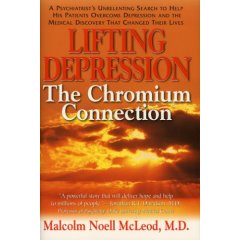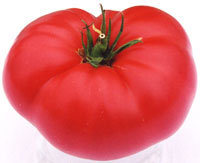
Do you, or someone you know struggle with some of the following: fatigue, high cholesterol, carbohydrate/sugar cravings, weight gain, high blood pressure or have you been diagnosed with atypical depression? This book could be the breakthrough you've been waiting for.
It sounds too good to be true, but when the peer reviewed scientific literature backs up the claims, you have to sit up and take notice.
In this fabulous book, Dr. McLeod shares his incredible & accidental discovery that a nutrient deficiency (Chromium) is at the root of a glucose metabolism problem "insulin resistance" that can lead to a suite of health symptoms (above) that include atypical depression.
The book outlines how a simple supplementation with Chromium Picolinate at the right dosage along with excerise and diet changes, lead to dramatic and complete relief for many people in as little as 2 days. Dr. McLeod chronicles the story of this discovery as he experiences the joy and surprise of many of his patients as they encounter relief from depression (and much more). Most of them report a dramatic elevation in mood, increased energy, reduced cravings for carbohydrates and vivid color in their dreams. One patient (Sarah) found that chromium picolinate relieved almost all her symptoms of PMS. She said, "Chromium eliminates my irritability, depression, hyper-sensitivity to light and noise, craving for sweets, cramps, and I'm able to work and be around people." Another patient found that chromium reduced their craving for alcohol.
Unfortunately, western diets that are high in refined carbohydrates such as white potatoes, white rice, white sugar, white bread, pastries and pasta help to increase urinary excretion of chromium by up to 300%. This is one reason why Type II diabetes is most common in countries with a high consumption of refined carbohydrates. When it comes to food, a good rule of thumb is . . ."If it's white, it ain't right!"
Chromium deficiency is common in the United States. Taking supplemental chromium has been shown to significantly improve insulin function, decrease fasting glucose, cholesterol and triglyceride levels and also to increase beneficial HDL cholesterol. The protective role of chromium is further supported by the fact that diabetes is rare in Africa, China and other countries where whole, unrefined foods are the staples in the diet (other factors preventing diabetes in those countries include high-fiber, low calorie diets and exercise). Taking 200 to 1,000 mcg of tri-valent chromium (also called GTF or "Glucose Tolerance Factor" chromium) can help control symptoms in persons deficient in chromium but is not enough to completely control or reverse diabetes. A good diet, exercise and possibly other nutritional supplements are also essential.

 My StumbleUpon Page
My StumbleUpon Page





